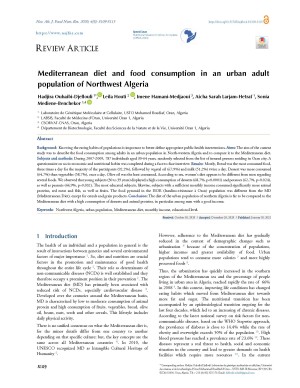Mediterranean diet and food consumption in an urban adult population of Northwest Algeria
Abstract
Background: Knowing the eating habits of populations is important to better define appropriate public health interventions. Aims: The aim of the current study was to describe the food consumption among adults in an urban population in North-western Algeria and to compare it to the Mediterranean diet. Subjects and methods: During 2007-2009, 787 individuals aged 30-64 years, randomly selected from the list of insured persons residing in Oran city. A questionnaire on socio-economic and nutritional habits was completed during a face-to-face interview. Results: Mostly, Bread was the most consumed food, three times a day for the majority of the participants (92.2%), followed by vegetal oil (67.9%) and milk (51.2%) twice a day. Dessert was more consumed (64.7%) than vegetables (58.7%), once a day. Olive oil was the least consumed. According to sex, women’s diet appears to be different from men regarding several foods. We observed that young subjects (30 to 39 years) displayed a high consumption of desserts (68.7%, p<0.0001) and potatoes (62.7%, p=0.024), as well as peanuts (44.9%, p=0.032). The most educated subjects, likewise, subjects with a sufficient monthly income consumed significantly more animal proteins, red meat and fish, as well as fruits. The food pyramid in the ISOR (Insulino-résistance à Oran) population was different from the MD (Mediterranean Diet), except for cereals and grain products. Conclusion: The diet of the urban population of northern Algeria is far to be compared to the Mediterranean diet with a high consumption of desserts and animal proteins, in particular among men with a good income.
Full text article
Authors
Copyright (c) 2020 Authors

This work is licensed under a Creative Commons Attribution 4.0 International License.
-
Attribution — You must give appropriate credit, provide a link to the license, and indicate if changes were made. You may do so in any reasonable manner, but not in any way that suggests the licensor endorses you or your use.
-
No additional restrictions — You may not apply legal terms or technological measures that legally restrict others from doing anything the license permits.





